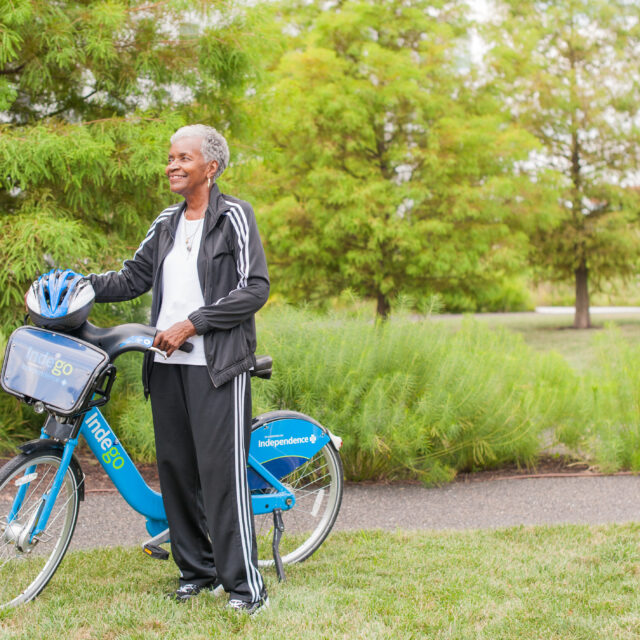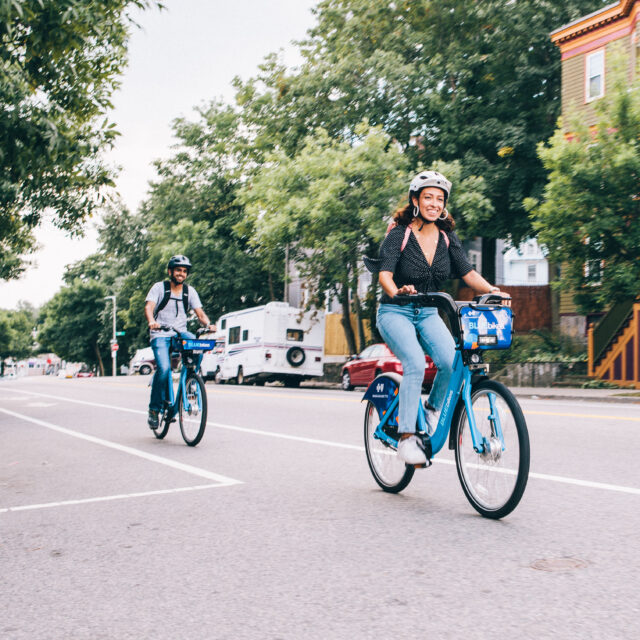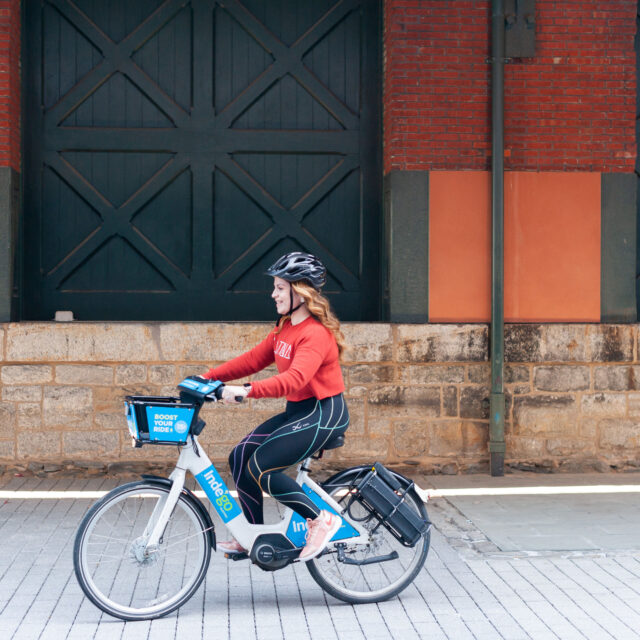Bike Share Creates New Cyclists, Saves People Money
by Kiran Herbert, Communications Manager
June 7, 2023
A new report out of the U.K. highlights how bike share systems lead to healthier outcomes and more equal communities.
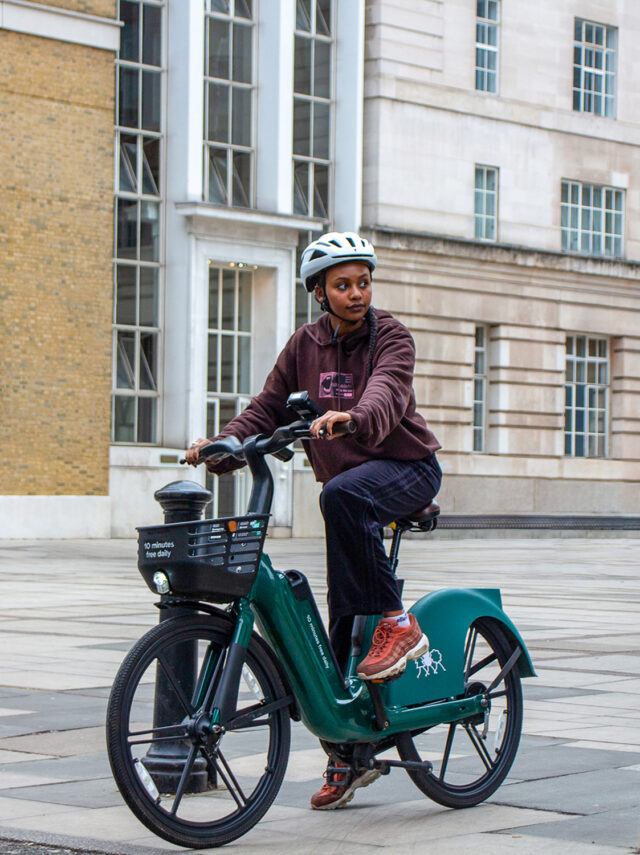
At the Better Bike Share Partnership, we’ve never doubted the positive impact bike share can have on communities, especially when deployed equitably. There’s new evidence, however, that points to the specific ways bike share fosters positive change, such as by creating new riders and encouraging more frequent bicycling.
The 2022 “CoMoUK Annual Bike Share Report,” from the U.K.-based transportation nonprofit Collaborative Mobility UK (CoMoUK), surveyed more than 2,200 active bike share users between September 2021 and September 2022 (the total number of U.K. bike share users hovers around 1.3 million). Users came from more than 10 different cities with a variety of different bike share systems.
The ethnic composition of respondents roughly mirrors the U.K.’s overall demographics, although whites were slightly underrepresented, suggesting that bike share systems are attracting a relatively diverse group of users, compared to Britain’s general population. Still, of those surveyed, men remain over-represented and older riders underrepresented, meaning there’s still work to be done at a global level to both achieve gender parity and age parity.
While this is the CoMoUK’s seventh annual report, this year’s data offers new evidence of bike share schemes’ positive environmental, economic, and social effects on individuals and communities.
🚲 Bike Share Motivates People to Pick Up Cycling
Of those surveyed, 53% said they started bicycling again after at least one year, 26% said they hadn’t ridden a bike in five years or more, and 7% reported that they’d never used a bike before trying bike share. The fact that 7% of bike share users were completely new is really cool — it highlights how bike share can increase bicycling mode share overall and bring in new riders (something the bike industry has arguably struggled with). What’s more, the data shows that a higher percentage of women are incentivized to pick up cycling again after a break of one year or more (66%), compared to men (61%).
🚴🏿♀️ Bike Share Incentivizes More Frequent Cycling
Two-thirds of respondents (66%) said that they have been cycling more often (40%) or much more often (26%) since joining bike share. Of those who said they rented e-bikes, 69% said that they have been riding more often (36%) or much more often (33%) than before joining bike share.
One possible reason for an uptick in bicycling amongst users? The notable benefits to users’ physical and mental health. A whopping 84% of respondents agreed that bike share provides them with exercise, helping increase levels of physical activity, while 76% of users agree that bike share provides them with mental health benefits.
🚍 Bike Share Compliments Transit and Reduces Car Use
When asked what people were using bike share for, the most common response (35%) was to commute at least once a week. In total, 62% of respondents use bike sharing at least
once a month for their commute or work-related travel. Other trip purposes included accessing shops, medical services, education, entertainment, or for leisure activities. In fact, 56% reported using bike share for pleasure or exercise at least monthly, while 52% reported using it to visit family and friends. Importantly, bike share is also regularly used by 54% of respondents to access public transportation, showcasing how transit and bike share work together.
It should come as no surprise that those surveyed reported that bike share replaces many trips they otherwise would have been made by car. When asked which mode of transport survey respondents would be most likely to use for their most common trip if bike share wasn’t available, 37% chose the car, either as the driver (21%) or passenger in a privately owned vehicle (6%) or by using a vehicle for hire (10%). In the majority of cases (64%), respondents reported that they combined their most common bike share trips with other means of transport, the most common being a bus (23%), train (22%), and the underground, tram, light rail (10%), or e-scooter (4%), a mode that’s notably only available in a fraction of the cities surveyed.
As a result of the mode shift caused by bike share, it follows that bike share also reduces carbon emissions — 71kg of CO2 emissions are reduced on average by every bike share user each year.
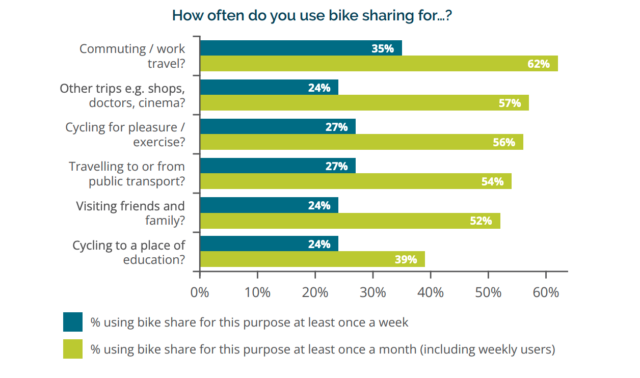
💰 Bike Share Saves Users Money
Of the 2,000-plus survey respondents, 24% were from low-income groups living on less than $25,000 a year, a number that speaks to bike share’s ability to improve mobility options for a historically underserved demographic. The study also demonstrated that bike share saves many people money, regardless of their income level. For example, 61% of respondents agreed with the statement that bike share saves them money (30% strongly agreed, while 31% somewhat agreed).
By collectivizing the risks associated with owning and maintaining a bike, bike share also supports those individuals that are unable or unwilling to maintain a personal bike. Some 74% of respondents agreed that bike share took away concerns around bike maintenance and storage, while 80% said that it took away the worry of theft.
Still, in many instances, the use of bike share schemes and individual ownership of bikes are complementary rather than mutually exclusive: 45% of respondents stated that they already had a pedal bike, while 10% already owned an e-bike. There’s also evidence that bike share can be a gateway to ownership, with 26% of respondents stating that they had bought a pedal bike or e-bike since joining.
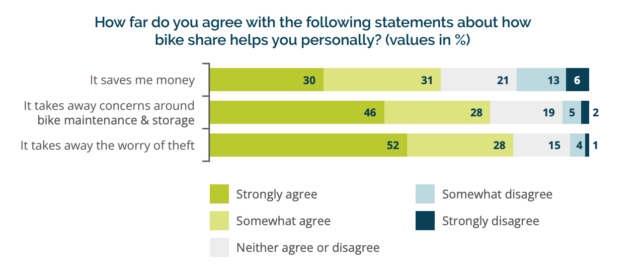
CoMoUK’s recent study bodes well for bike share. Going forward, however, we’d love to see the study report on the prevalence and impact of community engagement initiatives, such as learn-to-ride classes and group rides, as well as low-income pricing schemes. We believe these sorts of initiatives can have a huge impact on bringing in new riders and encouraging use, especially amongst those from underserved communities. The more data that speaks to the effectiveness of community engagement in contributing to these incredible outcomes, the better.
The Better Bike Share Partnership is funded by The JPB Foundation as a collaboration between the City of Philadelphia, the National Association of City Transportation Officials (NACTO), and the PeopleForBikes Foundation to build equitable and replicable bike share systems. Follow us on LinkedIn, Facebook, Twitter, and Instagram, or sign up for our weekly newsletter. Have a question or a story idea? Email kiran@peopleforbikes.org.

